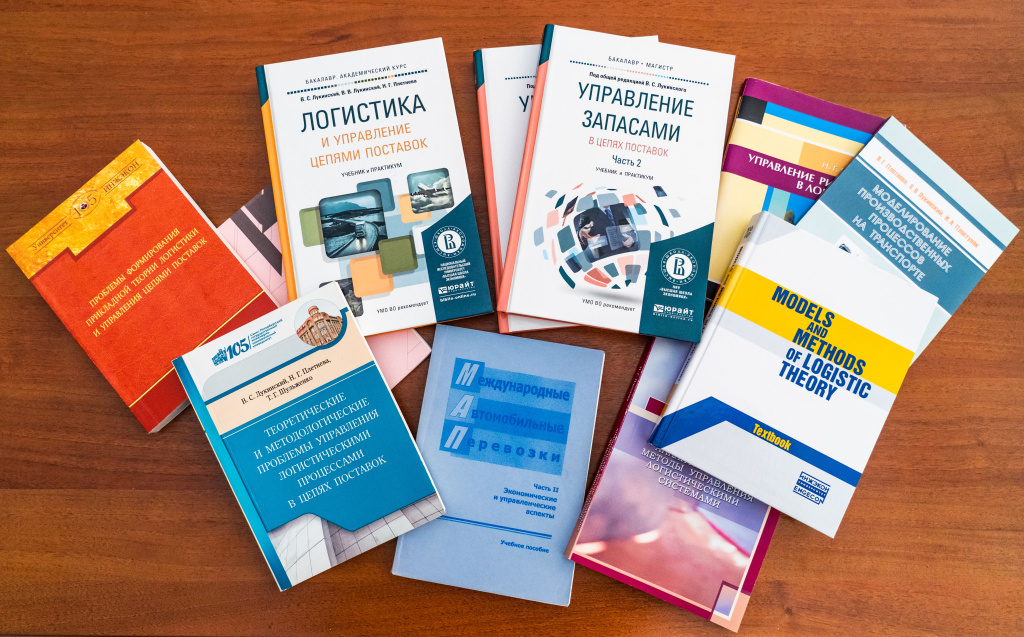 Natalya Pletneva
Natalya Pletneva
Natalya Pletneva, Head of the SPbGASU Department of Management in Construction, focuses on logistics and supply chain management. Natalya Gennadievna has published more than 270 works, including four monographs and 35 textbooks and study guides; became the editor and compiler of 18 publications. She manages the main professional program in the field of 38.03.02 Management, the specialization "Logistics and supply chain management". She is a member of the Dissertation Council D212.223.04 at SPbGASU. The owner of the Gratitude of the Ministry of Science and Higher Education of the Russian Federation for a significant contribution to the development of education and conscientious work.
 Published works
Published works
We asked Natalya Gennadievna to tell us about her scientific activities and about who helped and is helping along this path.
– I took my first step forward science when I was still a student, taking part in a competition of scientific papers. Prize-winning place prompted to continue.
Valery Sergeevich Lukinskiy, a very well-known specialist in the field of economics and management in transport and logistics, was my PhD supervisor and advisor to my doctoral dissertation. He is well known at our university, as he worked at the Faculty of Automobile and Road Building. Many of my scientific and educational works are written in collaboration with him.
Valery Sergeevich is my Teacher with a capital letter. I learned a lot from him as a tutor, scientist, person. In difficult situations, I think of what the Teacher would do? And every time again and again I am convinced of his wisdom.
– Please tell us about your research.
– My research is related to the economics and management in transport. PhD thesis was devoted to optimizing the structure of the fleet of vehicles. Its main result was a model and methodology that allows minimizing the costs of a transport company for the purchase and maintenance of rolling stock. The study was conducted on the basis of the bus fleets of St Petersburg.
My doctoral dissertation was devoted to the theory and methodology of managing logistics systems under conditions of uncertainty. It proposes principles, methods of management, shows the evolution of logistics management based on the trinity of management - marketing - logistics, proposes a set of methods for decision-making in the management of logistics systems. In addition, much attention was paid to the management of logistics in conditions of risk and uncertainty, a classification of methods and models of logistics for these conditions was developed, as well as the classification of risks in logistics, a methodological approach to choosing a forecasting method for logistics tasks.
Today, 15 years after defending myr doctoral dissertation, its results seem mundane and simple. Maybe because I use them in my work. The provisions of the dissertation concerning the management of logistics activities under risk and uncertainty formed the basis of the discipline Risk Management in Logistics, which I teach. An improved method of conducting XYZ analysis of stocks depending on the uncertainty of demand based on forecasting error has become one of the issues considered in another discipline - Supply Chain Inventory Management. (XYZ-analysis is an analysis that allows you to classify a company's resources depending on the nature of their consumption and the accuracy of predicting changes in demand for them during a certain time cycle.)
Based on the materials of the doctoral thesis, the monograph "Analytical methods for managing logistics systems" was written (Pletneva, N. G. Analytical methods for managing logistics systems: monograph / N. G. Pletneva. - St Petersburg: SPbGIEU Publishing House, 2007).
– What are your most significant publications?
– The monograph "Problems of the formation of the applied theory of logistics and supply chain management" (Problems of the formation of the applied theory of logistics and supply chain management: monograph // Edited by V. S. Lukinsky and N. G. Pletneva. - St Petersburg: SPbGIEU Publishing House , 2011) was exhibited at the London Book Fair in 2011 and then transferred to the Publishing and Printing Association of Russian Universities. The experts highly appreciated this work, because it presented absolutely new materials at that time, which inspired many specialists to continue their research.
– What are you working on now?
– I am continuing my research in supply chain management with a focus on construction and related fields. In construction, as in other sectors of the economy, it is necessary to take into account the interests of all participants in the investment and construction process and supply chains and coordinate their actions, as well as consider the total costs of supplying materials and concluding contracts.
If this is not done, a purchase that is advantageous in terms of the cost of materials turns into high costs for both storage and other operations. This may be due to improper packaging, inconsistency in technical and technological parameters. Additional costs are also possible - for example, in order to place a large batch of profitably purchased materials, it is necessary to clear the territory, cut down the forest - and these are costs. Logistics must consider everything.
– Do you have mentees?
– Under my supervision, five students defended their PhD theses. Their works were devoted to the design of supply chains: which supplier or logistics intermediary to choose, how to weed out the unreliable; logistics coordination of supply chain participants; development of a logistics strategy and supply chain management.
– What are your future plans?
– My plans are not to stop, not to lose interest in scientific research. It seems to me that if a person is not fed up, he always has something to do. The work of a teacher, head of a department requires a lot of time, and there is little left for research. But when you find the time, you enjoy it. You feel like you've put it to good use. People who are not interested in scientific work do not work in universities.